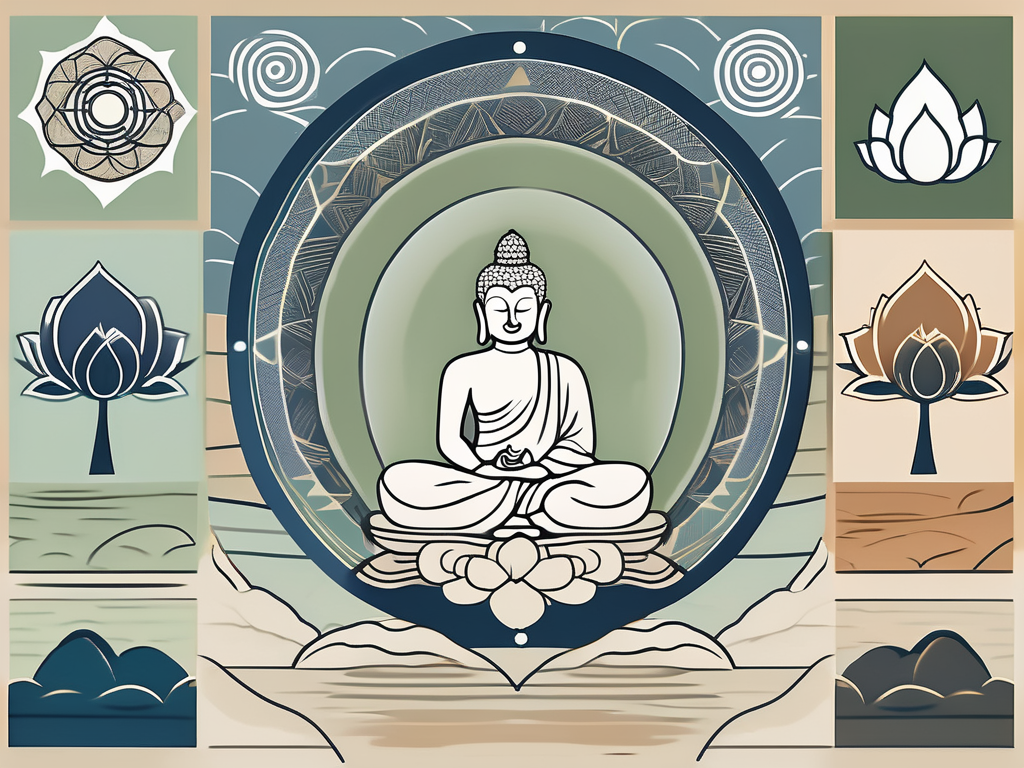Buddhism, with its profound wisdom and teachings, has long captivated people seeking enlightenment and spiritual growth. At the heart of this ancient philosophy lies a powerful concept: “What You Think, You Become.” In this article, we will explore the significance of this concept in unlocking the path to becoming Buddha.
Understanding the Concept: What You Think, You Become
Imagine for a moment the power that lies within your mind. Your thoughts, beliefs, and perceptions shape your reality. This fundamental truth forms the foundation of the concept “What You Think, You Become.” It emphasizes the crucial role your mind plays in transforming your life and achieving enlightenment.
When we delve deeper into the concept of “What You Think, You Become,” we realize that our thoughts are not mere fleeting ideas, but rather the building blocks of our reality. Every thought we have carries a certain energy and vibration that influences our experiences and the world around us.
It is said that the mind is like a fertile garden, ready to nurture and grow whatever seeds are planted within it. Your thoughts are like seeds that, when nurtured with awareness and intention, will grow into actions and ultimately determine your destiny. By consistently choosing thoughts that align with compassion, kindness, and peace, you pave the way to becoming Buddha.
The Power of Mind in Shaping Reality
Our thoughts have the power to create our reality. Positive thoughts lead to positive actions, while negative thoughts breed negativity. By cultivating a mindful and positive mindset, we can shape our reality and attract positive experiences into our lives. The power lies within us to manifest the life we desire.
When we consciously choose to focus on positive thoughts, we begin to notice a shift in our energy and the way we interact with the world. We become more aware of the opportunities and possibilities that surround us, and we start to attract people and circumstances that align with our positive mindset.
It is important to remember that the power of the mind is not limited to manifesting material possessions or external success. It also plays a crucial role in our inner transformation and spiritual growth. By cultivating thoughts of love, gratitude, and compassion, we not only create a harmonious external reality but also nurture our own spiritual well-being.
The Role of Perception in Personal Transformation
Perception influences how we perceive the world, ourselves, and others. It colors our experiences and shapes our reality. By cultivating a wise perception, we can transform our perspective and break free from limiting beliefs and attachments.
For example, if we view life’s challenges as opportunities for growth rather than obstacles, we shift our perception towards a positive and empowering mindset. This shift in perception allows us to navigate difficulties with grace and resilience, ultimately accelerating our journey towards enlightenment.
Changing our perception requires a willingness to question our preconceived notions and challenge the beliefs that no longer serve us. It involves embracing a mindset of curiosity and openness, allowing us to see beyond the surface and uncover the deeper truths that lie within ourselves and the world.
As we continue to explore the concept of “What You Think, You Become,” we realize that personal transformation is not a one-time event but an ongoing process. It requires consistent effort and a commitment to self-reflection and growth. By harnessing the power of our thoughts and cultivating a wise perception, we can shape our reality and become the best version of ourselves.
The Journey to Becoming Buddha: A Closer Look
The path to becoming Buddha is not an overnight transformation but a journey of self-discovery and realization. To embark on this path, we must first understand the life and teachings of Buddha himself.
Let us delve deeper into the fascinating journey of Siddhartha Gautama, the prince who renounced his luxurious life in search of spiritual truth. Born into a world of opulence and privilege, Siddhartha’s decision to leave behind his comfortable existence was a profound act of courage and determination.
For years, Siddhartha immersed himself in the practice of meditation and self-reflection. He sought answers to life’s most profound questions and explored the depths of his own consciousness. Through his unwavering dedication and relentless pursuit of truth, he attained enlightenment and became the Buddha, the awakened one.
Buddha’s life is a testament to the transformative power that lies within each of us. It serves as an inspiring reminder that regardless of our background or circumstances, we too can embark on a journey of self-transformation and attain enlightenment.
Buddha’s Teachings: A Path to Liberation
The core teachings of Buddhism, known as the Dharma, provide a blueprint for personal growth and spiritual development. These teachings offer profound insights into the nature of existence and provide practical guidance on how to live a meaningful and fulfilling life.
At the heart of Buddha’s teachings are the four noble truths, which encapsulate the fundamental principles of human suffering and its cessation. The first noble truth acknowledges the existence of suffering in the world, highlighting the universal nature of human pain and dissatisfaction.
The second noble truth delves into the causes of suffering, exploring the role of attachment, desire, and ignorance in perpetuating our discontentment. By understanding the root causes of suffering, we can begin to address them and find freedom from their grip.
The third noble truth offers hope and liberation, proclaiming that the cessation of suffering is possible. Buddha teaches that by letting go of attachment and cultivating wisdom, we can transcend suffering and experience lasting peace.
The fourth noble truth outlines the path to the cessation of suffering, known as the eightfold path. This path comprises eight interconnected principles that guide practitioners towards liberation and enlightenment.
From Right View and Right Intention to Right Mindfulness and Right Concentration, these principles provide a roadmap for cultivating wholesome thoughts, actions, and speech. They encourage us to live with integrity, compassion, and mindfulness, fostering a deep sense of inner peace and harmony.
By following the teachings of Buddha and embracing the noble truths and the eightfold path, we can navigate the complexities of life with wisdom and grace. The path to becoming Buddha is not a destination but a lifelong journey of self-discovery and transformation.
The Practice of Mindfulness: A Key to Transformation
Mindfulness, a central practice in Buddhism, holds the key to personal transformation. By cultivating mindful awareness, we bring our attention to the present moment and cultivate a deep sense of presence and clarity.
But what does it mean to be mindful? Mindfulness is the art of being fully present, of bringing our attention to the here and now. In today’s fast-paced world, it’s easy to get caught up in the worries of the past or the anxieties of the future. However, true transformation can only occur when we fully embrace the present moment.
Imagine this: you are sitting in a beautiful garden, surrounded by vibrant flowers and the gentle sound of birds chirping. Your mind is calm, and you are fully aware of the sensations in your body as you breathe in and out. There are no distractions, no worries about what has happened or what might happen. You are simply here, in this moment, experiencing life as it unfolds.
The Art of Being Present
In the art of being present, we learn to let go of our attachment to the past and the future. We recognize that the past is gone, and the future is yet to come. All we have is this moment, and by anchoring ourselves in the here and now, we allow ourselves to connect with our inner selves and access profound levels of insight and growth.
Being present is not always easy. Our minds are constantly pulled in different directions, and our thoughts often wander. But with practice, we can train our minds to come back to the present moment, to focus on what is happening right now.
When we are fully present, we become more attuned to our own needs and desires. We can listen to our bodies and minds, and respond with kindness and compassion. We become more aware of the impact of our actions on ourselves and others, and we can make choices that align with our values and goals.
Mindfulness and Its Impact on Personal Growth
Mindfulness has proven benefits for personal growth and well-being. By practicing mindfulness, we cultivate self-awareness, compassion, and non-judgment. This heightened awareness allows us to observe and transform our thoughts, emotions, and behaviors with wisdom and compassion.
When we are mindful, we become more aware of our patterns and habits. We can recognize when we are reacting out of fear or anger, and we can choose to respond with kindness and understanding instead. This shift in perspective can have a profound impact on our relationships, our work, and our overall well-being.
Through consistent practice, mindfulness becomes an integral part of our being, guiding us on the path to becoming Buddha. As we deepen our practice, we may find that we experience moments of profound insight and awakening. We may discover a sense of peace and contentment that goes beyond our everyday worries and concerns.
So, let us embark on this journey of mindfulness together. Let us cultivate the art of being present and embrace the transformative power of mindfulness. As we do so, we open ourselves up to a world of possibilities and discover the true potential that lies within us.
The Path of Enlightenment: Steps to Becoming Buddha
The path to enlightenment is not a linear progression but a continuous journey of self-discovery and evolution. It is a profound and transformative process that requires dedication, introspection, and a deep understanding of oneself and the world around us. While there is no one-size-fits-all approach to enlightenment, certain principles and practices serve as guideposts along this path, helping individuals navigate their way towards spiritual awakening.
Embarking on the path of enlightenment begins with embracing the Four Noble Truths, which provide a profound framework for understanding and transcending suffering. These truths, discovered by Siddhartha Gautama, the historical Buddha, are the cornerstone of Buddhist philosophy. They state that suffering is an inherent part of human existence, that suffering arises from attachment and desire, that suffering can be overcome, and that there is a path to liberation from suffering.
Embracing the Four Noble Truths
Embracing the Four Noble Truths requires a deep level of self-reflection and introspection. It involves recognizing the presence of suffering in our lives and understanding its causes. By cultivating an awareness of the impermanence of all things and the transient nature of our desires, we can begin to unravel the causes of suffering and move towards liberation.
Furthermore, embracing the Four Noble Truths involves acknowledging the interconnectedness of all beings and the impact our actions have on ourselves and others. It requires us to cultivate compassion and empathy, not only towards ourselves but also towards all living beings. By doing so, we create a foundation of understanding and kindness that can guide us on our journey towards enlightenment.
The Eightfold Path: A Guide to Enlightenment
While the Four Noble Truths provide a profound understanding of suffering, the Eightfold Path offers a comprehensive guide for personal transformation. This path, also known as the Middle Way, encompasses eight interconnected principles that, when practiced diligently, can lead to the cessation of suffering and the attainment of enlightenment.
The Eightfold Path consists of Right View, Right Intention, Right Speech, Right Action, Right Livelihood, Right Effort, Right Mindfulness, and Right Concentration. Each of these principles is interconnected and supports the others, creating a holistic approach to spiritual growth.
Right View involves understanding the nature of reality and seeing things as they truly are. It requires us to cultivate wisdom and discernment, recognizing the impermanence and interconnectedness of all phenomena.
Right Intention involves cultivating wholesome intentions and letting go of harmful desires. It requires us to develop compassion, loving-kindness, and non-harming towards ourselves and others.
Right Speech involves using our words to promote understanding, harmony, and truth. It requires us to refrain from lying, gossiping, harsh speech, and divisive speech, and instead, to speak with kindness, honesty, and mindfulness.
Right Action involves engaging in ethical conduct and refraining from actions that cause harm to oneself or others. It requires us to practice non-violence, refrain from stealing, and engage in sexual conduct that is free from harm and exploitation.
Right Livelihood involves earning a living in a way that is ethical and aligned with our values. It requires us to engage in work that does not cause harm to others and promotes the well-being of all beings.
Right Effort involves cultivating wholesome qualities and letting go of unwholesome ones. It requires us to cultivate mindfulness, energy, and perseverance in our spiritual practice.
Right Mindfulness involves cultivating a moment-to-moment awareness of our thoughts, feelings, bodily sensations, and the world around us. It requires us to be fully present and attentive, without judgment or attachment.
Right Concentration involves developing a focused and concentrated mind through meditation and other contemplative practices. It requires us to cultivate mental clarity and stability, allowing us to penetrate the nature of reality and experience profound states of insight.
By embodying the principles of the Eightfold Path, we align our thoughts, speech, and actions with wisdom and compassion, paving the way to enlightenment. It is through the diligent practice of these principles that we can transform ourselves and awaken to our true nature.
Overcoming Challenges on the Path to Enlightenment
The path to becoming Buddha is not without its challenges. It requires perseverance, patience, and the ability to navigate obstacles along the way.
Dealing with Doubt and Fear
Doubt and fear can be significant impediments on the path to enlightenment. However, by cultivating trust in ourselves and the teachings, we can transcend these obstacles and continue our journey with faith and courage.
Cultivating Patience and Perseverance
Becoming Buddha is a lifelong pursuit that requires patience and perseverance. The transformative journey may not always be smooth, but by staying committed and embracing the process with an open heart, we can steadily progress on the path towards enlightenment.
In conclusion, the path to becoming Buddha is a profound and transformative journey that begins with the power of the mind. By understanding the concept that “What You Think, You Become,” and incorporating the core teachings of Buddhism, practicing mindfulness, and navigating the challenges with perseverance, we can unveil the path to becoming Buddha in our own lives. May this article serve as an inspiration and guide for those seeking personal growth and enlightenment.












